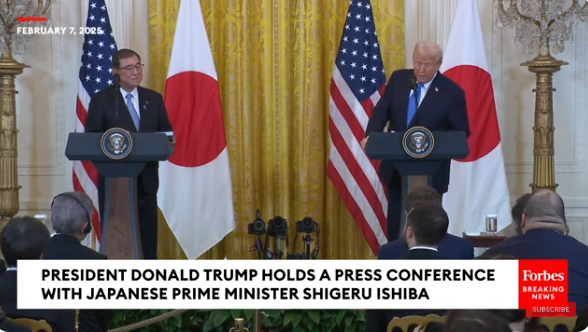Markets concluded that tariffs on Mexico and Canada would damage the economy and raise prices. But the tariffs got both countries to do what Trump wanted.
This is something even Greg Ip, chief economic commentator at the Wall Street Journal, notices.
With Donald Trump’s return to power, enthusiasm for tariffs and the arguments in favour of imposing them have increased: They will usher in an economic «golden age», they don’t lead to inflation, they are paid for by foreigners rather than Americans, and they are an effective tool in political conflicts.
Most economists disagree, but who listens to economists these days?
You have to wait until you see the effect of the measures before you condemn them, says Ip. You need «natural experiments». The 72 hours when President Trump was about to impose 25 per cent tariffs on goods from Canada and Mexico is one such experiment.
Maybe he should mention this to climate fanatics too? Predictions are not science: Science must be based on empirical evidence.
Anyway: Both Canada and Mexico reacted, and are now promising to secure their borders with the US, just what Trump wanted. As a result, Trump has put the tariffs on hold for a month, but neighbouring countries are not escaping the pressure.
The EU is in panic mode and thinks it can win a trade war by betting even more on green madness by introducing the «Clean Industrial Deal», a pure self-harm that our Norwegian government will probably follow blindly and obediently.
Ip understand that Trump is using tariffs as a bargaining chip, and so far it seems to be working. Market reactions were small and short-lived, and by Tuesday, when tariffs on Mexico and Canada were paused, much of this trend had been reversed.
So it took three days after Trump declared the imposition of tariffs from Saturday before the market was back in balance on the second trading day on Wall Street after the weekend.
This is just two days of market development, and there is hardly any guarantee that reality will be as investors predict, writes Ip.
The advantage of this judgement is that it is objective: Investors want to make money, not to make a point.
Supporters of tariffs argue that foreigners are so dependent on the US market that they would rather cut prices and accept tariffs than lose market share. Tariffs are thus seen by them as a gift to the US Treasury from foreigners.
The market generally sees this differently. But the oil price tells a different story: Despite Trump’s imposition of a USD 6 per barrel tariff on oil from Canada, the price of oil actually fell, while the opposite was supposed to happen, according to the so-called experts.
Still, the experts believe that tariffs will be detrimental to the economy. But maybe they don’t understand Trump’s motives?
What if the goal isn’t to help the economy, but to force your partners to meet your demands – on trade, national security and immigration? In that case, it’s okay for tariffs to hurt, as long as they hurt the other party more.
When Trump first threatened tariffs last November, both Mexico and Canada acted quickly to meet his demands to stop the flow of fentanyl and migrants.
But when the tariffs were actually imposed, both Mexico and Canada initially reacted more harshly. That didn’t last long, and Trump ended up as the clear winner in the short-lived «trade war». The China situation, however, will take longer.
Trump’s defenders insist that there is a difference between tariffs to negotiate (temporary by design) and tariffs to reduce the trade deficit and collect revenue (indefinite). But Trump himself makes no such distinction.
Trump, however, seems to see things differently. The tariffs against Mexico, Canada and China were not a negotiating tactic, Trump said on Saturday:
– It’s purely economic. We have big [trade] deficits with all three.
This should alarm Berlin, as Germany has a record-breaking trade surplus with the US. At the same time, German industry is experiencing an ongoing economic crisis caused by the headless policy of the Energiewende, as well as by the consequences of the massive immigration of unproductive people from the Middle East and Africa. In particular, the vital German car industry is struggling in the shadow of climate targets.
Trump is threatening tariffs on Japanese goods if the US trade deficit with Japan is not levelled out. Trump said this while Japanese Prime Minister Shigeru Ishiba was visiting Washington on Friday, writes NTB-AFP.
Canada and Mexico have worked hard for 30 years to integrate themselves into the huge US market. So they can’t irritate a president who doesn’t hesitate for a second to attack America’s opponents.
As long as tariffs are used as a bargaining chip, there is little Canada and Mexico can do. They simply have to follow the orders of the new sheriff in Washington DC.
There is little reason to hope that the EU and Norway will follow the same tactics. The EU suffers from a delusion and thinks it can win the competition against the US by focusing even harder on the green shift. Our politicians are bending over backwards for Brussels.


